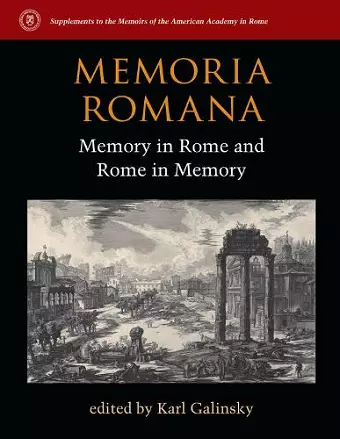Memoria Romana
Memory in Rome and Rome in Memory
Format:Hardback
Publisher:The University of Michigan Press
Published:30th Apr '14
Currently unavailable, and unfortunately no date known when it will be back

Concern with memory permeated Roman literature, history, rhetorical training, and art and architecture. This is the first book to look at the phenomenon from a variety of perspectives, including cognitive science. There is no orthodoxy in memory studies and the approaches are both empirical and theoretical. A central issue is: who and what preserved and shaped cultural memory in Rome, and how did that process work? Areas and subjects covered include the Romans' view of the changing physical fabric of the city, monuments (by etymology related to memory) such as the Arch of Constantine, memory and the Roman triumph, Roman copies of Greek sculpture and their relation to memory, the importance of written information and of continuing process, the creation of memory in Republican memoirs and Flavian poetry, the invention of traditions, and the connection of cultural and digital memory.
The ten chapters present original findings that complement earlier scholarship from the perspective of memory and open up new horizons for inquiry. The introduction by volume editor Karl Galinsky situates the work within current studies on cultural and social memory, and the concluding chapter by Daniel Libeskind provides the perspective of a contemporary practitioner.
Additional contributors include Richard Jenkyns, Harriet I. Flower, T. P. Wiseman, Karl-J. Hölkeskamp, Gianpiero Rosati, Diane Favro, Jessica Hughes, Anna Anguissola, Lisa Marie Mignone, and Bernard Frischer.
Ancient historians have much to learn from better understanding how the memories of the artists and authors who now constitute their primary sources were shaped and shared, how and why Romans remembered, and how these processes of remembering differed from what they then chose to inscribe, and forget. At least from the time of Ennius, Rome’s present was always also its past."
--Bryn Mawr Classical Review
"The chapters are all of a very high standard, and therefore make significant contributions to their individual subject areas, whilst demonstrating the potential of memory studies in opening up fresh interpretive avenues in research into the ancient world."
--Journal of Roman Studies
"Opens up enriching perspectives on the current correlations between architecture and memory."
--L'Antiquite Classique
ISBN: 9780472119431
Dimensions: unknown
Weight: unknown
212 pages